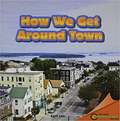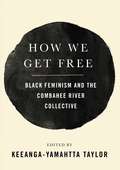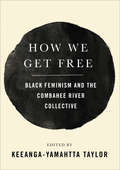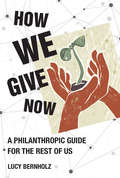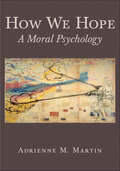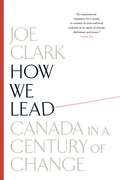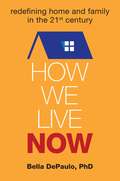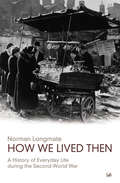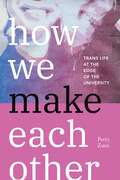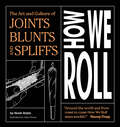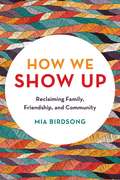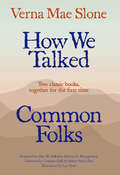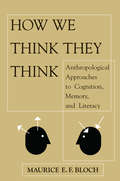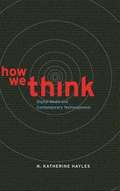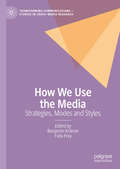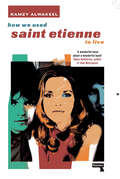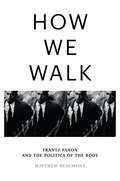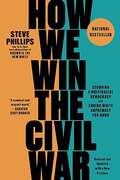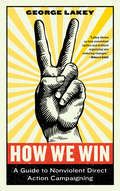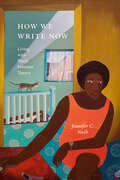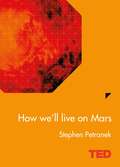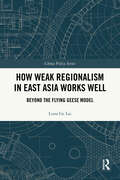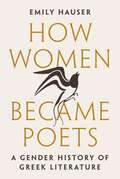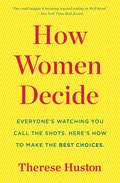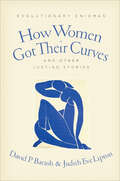- Table View
- List View
How We Get Around Town (Infomax Common Core Readers)
by April LeeExplains the different ways people can get around town, including walking, biking, and driving.
How We Get Free: Black Feminism and the Combahee River Collective
by Keeanga-Yamahtta TaylorThe Combahee River Collective, a path-breaking group of radical black feminists, was one of the most important organizations to develop out of the antiracist and women's liberation movements of the 1960s and 70s. In this collection of essays and interviews edited by activist-scholar Keeanga-Yamahtta Taylor, founding members of the organization and contemporary activists reflect on the legacy of its contributions to Black feminism and its impact on today's struggles.
How We Get Free: Black Feminism and the Combahee River Collective
by Keeanga-Yamahtta TaylorBlack feminists remind us “that America’s destiny is inseparable from how it treats [black women] and the nation ignores this truth at its peril” (The New York Review of Books). <P><P>Winner of the 2018 Lambda Literary Award for LGBTQ Nonfiction <P><P> “If Black women were free, it would mean that everyone else would have to be free.” —Combahee River Collective Statement <P><P> The Combahee River Collective, a path-breaking group of radical black feminists, was one of the most important organizations to develop out of the antiracist and women’s liberation movements of the 1960s and 70s. In this collection of essays and interviews edited by activist-scholar Keeanga-Yamahtta Taylor, founding members of the organization and contemporary activists reflect on the legacy of its contributions to Black feminism and its impact on today’s struggles. <P><P>“A striking collection that should be immediately added to the Black feminist canon.” —Bitch Media “An essential book for any feminist library.” —Library Journal “As white feminism has gained an increasing amount of coverage, there are still questions as to how black and brown women’s needs are being addressed. This book, through a collection of interviews with prominent black feminists, provides some answers.” —The Independent “For feminists of all kinds, astute scholars, or anyone with a passion for social justice, How We Get Free is an invaluable work.” —Ethnic and Racial Studies Journal
How We Give Now: A Philanthropic Guide for the Rest of Us
by Lucy BernholzFrom Go Fund Me to philanthropy: the everyday ways that we can give our money, our time, and even our data to help our communities and seek justice.In How We Give Now, Lucy Bernholz shows that philanthropy is more than writing a check and claiming a tax deduction. For most of us--the non-wealthy givers--philanthropy can be a way of living our values and fully participating in society. We give in all kinds of ways--shopping at certain businesses, canvassing for candidates, donating money, and making conscious choices with our retirement funds. We give our cash, our time, and even our data to make the world a better place. Bernholz takes readers on a tour of the often-overlooked worlds of participatory philanthropy, learning from a diverse group of forty resourceful givers. Donating our digitized personal data is an emerging form of philanthropy, and Bernholz describes safe, equitable, and effective ways of doing so--giving genetic data for medical research through a nonprofit genetics organization rather than a commercial one, for example, or contributing photographs to an online archive like the Densho Digital Repository, which documents America's internment of 120,000 Americans of Japanese descent. Bernholz tells us to "follow the money," however, when we're asked to "add a dollar" to our total at the cash register, or when we buy a charity-branded product; it's more effective to give directly than to give while shopping. Giving is a form of participation. Philanthropy by the rest of us--across geographies and cultural traditions--begins with and builds on active commitment to our communities.
How We Hope: A Moral Psychology
by Adrienne M. MartinWhat exactly is hope and how does it influence our decisions? In How We Hope, Adrienne Martin presents a novel account of hope, the motivational resources it presupposes, and its function in our practical lives. She contends that hoping for an outcome means treating certain feelings, plans, and imaginings as justified, and that hope thereby involves sophisticated reflective and conceptual capacities. Martin develops this original perspective on hope--what she calls the "incorporation analysis"--in contrast to the two dominant philosophical conceptions of hope: the orthodox definition, where hoping for an outcome is simply desiring it while thinking it possible, and agent-centered views, where hoping for an outcome is setting oneself to pursue it. In exploring how hope influences our decisions, she establishes that it is not always a positive motivational force and can render us complacent. She also examines the relationship between hope and faith, both religious and secular, and identifies a previously unnoted form of hope: normative or interpersonal hope. When we place normative hope in people, we relate to them as responsible agents and aspire for them to overcome challenges arising from situation or character. Demonstrating that hope merits rigorous philosophical investigation, both in its own right and in virtue of what it reveals about the nature of human emotion and motivation, How We Hope offers an original, sustained look at a largely neglected topic in philosophy.
How We Lead: Canada in a Century of Change
by Joe ClarkA passionate argument for Canada's reassertion of its place on the world stage, from a former prime minister and one of Canada's most respected political figures. In the world that is taking shape, the unique combination of Canada's success at home as a diverse society and its reputation internationally as a sympathetic and respected partner consititute national assets that are at least as valuable as its natural resource wealth. As the world becomes more competitive and complex, and the chances of deadly conflict grow, the example and the initiative of Canada can become more important than they have ever been. That depends on its people: assets have no value if Canadians don't recognize or use them, or worse, if they waste them. A more effective Canada is not only a benefit to itself, but to its friends and neighbours. And in this compelling examination of what it as a nation has been, what it has become and what it can yet be to the world, Joe Clark takes the reader beyond formal foreign policy and looks at the contributions and leadership offered by Canada's most successful individuals and organizations who are already putting these uniquely Canadian assets to work internationally.
How We Live Now
by Bella DepauloA close-up examination and exploration, How We Live Now challenges our old concepts of what it means to be a family and have a home, opening the door to the many diverse and thriving experiments of living in twenty-first century America.Across America and around the world, in cities and suburbs and small towns, people from all walks of life are redefining our "lifespaces"--the way we live and who we live with. The traditional nuclear family in their single-family home on a suburban lot has lost its place of prominence in contemporary life. Today, Americans have more choices than ever before in creating new ways to live and meet their personal needs and desires. Social scientist, researcher, and writer Bella DePaulo has traveled across America to interview people experimenting with the paradigm of how we live. In How We Live Now, she explores everything from multi-generational homes to cohousing communities where one's "family" is made up of friends and neighbors to couples "living apart together" to single-living, and ultimately uncovers a pioneering landscape for living that throws the old blueprint out the window. Through personal interviews and stories, media accounts, and in-depth research, How We Live Now explores thriving lifespaces, and offers the reader choices that are freer, more diverse, and more attuned to our modern needs for the twenty-first century and beyond.
How We Lived Then: History of Everyday Life During the Second World War, A
by Norman LongmateAlthough nearly 90% of the population of Great Britain remained civilians throughout the war, or for a large part of it, their story has so far largely gone untold. In contrast with the thousands of books on military operations, barely any have concerned themselves with the individual's experience. The problems of the ordinary family are barely ever mentioned - food rationing, clothes rationing, the black-out and air raids get little space, and everyday shortages almost none at all. This book is an attempt to redress the balance; to tell the civilian's story largely through their own recollections and in their own words.
How We Make Each Other: Trans Life at the Edge of the University
by Perry ZurnTrans people have always lived in the cracks of institutions—and the university is no exception. In How We Make Each Other, Perry Zurn tells the stories of how trans people make and live their lives at the edges of the university in ways that sometimes lead to policy change but always leave participants and institutions different than they were before. Using the Five Colleges in Massachusetts as a case study, Zurn notes that Amherst College, Hampshire College, Mount Holyoke College, Smith College, and the University of Massachusetts, Amherst, have been at the forefront of developing trans-inclusive policies in higher education, often in response to student organizing. Zurn focuses on the stories of trans students, staff, faculty, and community members within and alongside these institutions, exploring how they have built themselves and each other. Drawing on official archives as well as over 100 interviews, Zurn shows how trans people in the Five Colleges have made history, forged resistance habits, and cultivated hope.
How We Roll: The Art and Culture of Joints, Blunts, and Spliffs
by Noah RubinFrom rolling techniques to ast-roll-ology, interviews to do's and don'ts, quizzes to charts, this lively illustrated guide to all things joints has something for potheads and casual cannabis smokers alike. From the classic joint to The Scorpion, The Braid, The Holy Cross and beyond, How We Roll brings you the best and most important rolling techniques for your favorite herbal concoction, along with interviews, quizzes, charts, and eye-catching original art throughout. Exploring the many unique approaches to rolling through clever illustrations and clear instructions, How We Roll offers something new for every kind of smoker. Featuring insightful interviews with notable cannabis lovers like Wiz Khalifa, Dawn Richard, and Tommy Chong, explorations of rolling culture around the world, and tips and tricks for rolling an exceptional j, How We Roll is the perfect book for any weed connoisseur.GREAT GIFT: A must-have for potheads and causal smokers alikeACCESSIBLE AND EYE-CATCHING: Eye-catching art and design make this comprehensive guide to joints a unique and delectable gift for any cannabis loverEXPERT AUTHOR: Funny but authoritative author who provides a rich and well-rounded look at all things jointsHELPFUL CONTENT: Over 20 ways to roll a joint, with step-by-step instructions Perfect for:Cannabis enthusiastsFans of pot cultureJoint smokers
How We Show Up: Reclaiming Family, Friendship, and Community
by Mia BirdsongAn Invitation to Community and Models for ConnectionAfter almost every presentation activist and writer Mia Birdsong gives to executives, think tanks, and policy makers, one of those leaders quietly confesses how much they long for the profound community she describes. They have family, friends, and colleagues, yet they still feel like they're standing alone. They're "winning" at the American Dream, but they're lonely, disconnected, and unsatisfied.It seems counterintuitive that living the "good life"--the well-paying job, the nuclear family, the upward mobility--can make us feel isolated and unhappy. But in a divided America, where only a quarter of us know our neighbors and everyone is either a winner or a loser, we've forgotten the key element that helped us make progress in the first place: community. In this provocative, groundbreaking work, Mia Birdsong shows that what separates us isn't only the ever-present injustices built around race, class, gender, values, and beliefs, but also our denial of our interdependence and need for belonging. In response to the fear and discomfort we feel, we've built walls, and instead of leaning on each other, we find ourselves leaning on concrete.Through research, interviews, and stories of lived experience, How We Show Up returns us to our inherent connectedness where we find strength, safety, and support in vulnerability and generosity, in asking for help, and in being accountable. Showing up--literally and figuratively--points us toward the promise of our collective vitality and leads us to the liberated well-being we all want.
How We Talked and Common Folks
by Verna Mae SloneIn these two classic memoirs, the beloved Appalachian author shares a rare and vibrant look at the life and culture of her rural Kentucky home.A free-form combination of glossary and memoir, How We Talked is a timeless piece of literature that uses native expressions to depict everyday life in Caney Creek, Kentucky. In addition to phrases and their meanings, the book contains sections on the customs and wisdom of Slone's community, a collection of children's rhymes, and stories and superstitions unique to Appalachia.Originally published in 1979, Common Folks documents Slone's way of life in Pippa Passes, Kentucky, and expands on such diverse topics as family pets, coal mining, education, and marriage. Slone's firsthand account of this unique heritage draws readers into her hill-circled community and allows them to experience a lifestyle that is nearly forgotten.Whether Slone is writing about the particulars of Appalachian folk medicine or the universal experiences of family life, her deep insight and eye for evocative detail make for compelling reading. Published together for the first time, How We Talked and Common Folks celebrate the spirit of an acclaimed Appalachian writer.
How We Think They Think: Anthropological Approaches To Cognition, Memory, And Literacy
by Maurice E BlochThese essays by one of anthropology's most original theorists consider such fundamental questions as: Is cognition language-based? How reliable a guide to memory are people's narratives about themselves? What connects the ?social recalling? studied by anthropologists to the ?autobiographical memory? studied by psychologists? Now gathered in accessible form for the first time and drawing frequently upon the author's fieldwork among the Zafimaniry of Madagascar for ethnographic examples, the twelve closely linked essays of How We Think They Think pose provocative challenges not only to conventional cognitive models but to the basic assumptions that underlie much of ethnography. This book will be read with interest by those who study culture and cognition, ethnographic theory and practice, and the peoples and cultures of Africa.
How We Think: Digital Media and Contemporary Technogenesis
by N. Katherine Hayles"How do we think?" N. Katherine Hayles poses this question at the beginning of this bracing exploration of the idea that we think through, with, and alongside media. As the age of print passes and new technologies appear every day, this proposition has become far more complicated, particularly for the traditionally print-based disciplines in the humanities and qualitative social sciences. With a rift growing between digital scholarship and its print-based counterpart, Hayles argues for contemporary technogenesis--the belief that humans and technics are coevolving--and advocates for what she calls comparative media studies, a new approach to locating digital work within print traditions and vice versa. Hayles examines the evolution of the field from the traditional humanities and how the digital humanities are changing academic scholarship, research, teaching, and publication. She goes on to depict the neurological consequences of working in digital media, where skimming and scanning, or "hyper reading," and analysis through machine algorithms are forms of reading as valid as close reading once was. Hayles contends that we must recognize all three types of reading and understand the limitations and possibilities of each. In addition to illustrating what a comparative media perspective entails, Hayles explores the technogenesis spiral in its full complexity. She considers the effects of early databases such as telegraph code books and confronts our changing perceptions of time and space in the digital age, illustrating this through three innovative digital productions--Steve Tomasula's electronic novel, TOC; Steven Hall's The Raw Shark Texts; and Mark Z. Danielewski's Only Revolutions. Deepening our understanding of the extraordinary transformative powers digital technologies have placed in the hands of humanists, How We Think presents a cogent rationale for tackling the challenges facing the humanities today.
How We Use the Media: Strategies, Modes and Styles (Transforming Communications – Studies in Cross-Media Research)
by Felix Frey Benjamin KrämerThis volume considers strategies, modalities, and styles of media use and reception. Dynamic changes in media technology and infrastructure have spurred important changes in media use. Looking at these developments within the common conceptual framework of reception strategies, modes and styles of media use and reception, this volume is highly relevant against the background of the changing media environment. When it comes to media use and reception, communication research has mainly dealt with two much-cited questions: What do the media do with the people? What do the people do with the media? In comparison, the discipline has devoted less attention to how the media are used, the modalities, patterns or configurations of the actual practices of media use. The volume features original contributions, both empirical and theoretical, on the key concepts and approaches in the field, covering old and new media and different types of media content. Offering a comprehensive overview of existing research as well as promoting original findings and insights, the volume will be of interest to communication researchers, students, and scholars.
How We Used Saint Etienne to Live
by Ramzy AlwakeelThe essential guide to veteran British indie favourites Saint Etienne — the story of how they made music out of memories, and how we made memories out of them.Do you remember how we used to live? British indie favourites Saint Etienne do. But they also remember a load of other stuff that never happened, so maybe they aren&’t the best people to ask.Saint Etienne have spent three decades making music out of memories for people who make memories out of music. How We Used Saint Etienne to Live is the story of that reciprocal process, told in the wrong order but the right time. It&’s about the methods we use to remember, and what happens when those methods become outdated. It&’s a tale that involves tape splicing, town planning, Now compilations and Saint Etienne&’s 1995 UK singles chart peak, &‘He&’s On The Phone&’.Featuring original interviews with Bob Stanley, Pete Wiggs and Sarah Cracknell, How We Used Saint Etienne To Live shows Saint Etienne&’s minds at work as they make and manipulate history and nostalgia. Expect to be shown the receipts. Expect selective recollections and shameless revisionism. Expect concrete facts and flights of fancy. Don&’t expect it to be immediately clear which is which.
How We Walk: Frantz Fanon and the Politics of the Body
by Matthew Beaumont"In this fascinating and wide-ranging book, Beaumont reminds us that walking is far from a neutral activity. With the help of Frantz Fanon, Beaumont locates freedom at the level of the body; free from the systems of oppression, exploitation, and harassment."–Lauren Elkin, author of FlâneuseHow race, class, and politics influence the way we moveYou can tell a lot about people by how they walk. Matthew Beaumont argues that our standing, walking body holds the social traumas of history and its racialized inequalities. Our posture and gait reflect our social and political experiences as we navigate the city under capitalism. Through a series of dialogues with thinkers and walkers, his book explores the relationship between freedom and the human bodyHow We Walk foregrounds the work of Frantz Fanon, psychiatrist and leading thinker of liberation, who was one of the first people to think about the politics of &‘walking while black&’. It also introduces us to the renegade psychoanalyst Wilhelm Reich, who wrote that one could discern the truth about a person through their posture and gait. For Marxist philosopher Ernst Bloch, the ability to walk upright and with ease is a sign of personal and social freedom.Through these excursions, Beaumont reimagines the canonical literature on walking and presents a new interpretation of the impact of class and race on our physical and political mobility, raising important questions about the politics of the body.
How We Win the Civil War: Securing a Multiracial Democracy and Ending White Supremacy for Good
by Steve PhillipsNational political commentator Steve Phillips’s “politically charged and thoughtfully reasoned” (Kirkus Reviews) How We Win the Civil War helped chart the way forward for progressives and people of color, arguing that Democrats must recognize the nature of the fight we’re in, which is a contest between democracy and white supremacy left unresolved after the Civil War. Combining a powerful grasp of history with Phillips’s trademark, no-nonsense political critique, this “spirited and persuasive . . . rousing call for change” (Publishers Weekly) argues that we will not overcome until we govern as though we are under attack—until we finally recognize that the time has come to finish the conquest of the Confederacy and all that it represents. <p> With a new preface laying out what is at stake in the 2024 general election, Phillips delivers razor-sharp prescriptions for the new political season, including specific guidance for politicians, policymakers, and ordinary citizens alike. “A foundational contribution to the emerging field of multiracial democracy” (Spencer Overton), How We Win the Civil War is the essential political book for 2024 and beyond—showing us how to rid our politics of white supremacy, once and for all.
How We Win: A Guide to Nonviolent Direct Action Campaigning
by George LakeyA lifetime of activist experience informs this playbook for building and conducting nonviolent direct action campaignsBeginning as a trainer in the civil rights movement of the 1960s, George Lakey has been on the front lines of social change for decades. Now, in this timely and down-to-earth guide, he passes the torch to a new generation of activists hitting the streets. He looks to successful campaigns across the world to help us see what has worked and what hasn’t: from choosing the right target, to designing a creative campaign; from avoiding burnout within your group, to building a movement of movements to achieve real progressive victories. Drawing on the experiences of a diverse set of ambitious change-makers, How We Win shows us the way to justice, peace, and a sustainable economy. This is what democracy looks like.
How We Write Now: Living with Black Feminist Theory (Black Feminism on the Edge)
by Jennifer C. NashIn How We Write Now Jennifer C. Nash examines how Black feminists use beautiful writing to allow writers and readers to stay close to the field’s central object and preoccupation: loss. She demonstrates how contemporary Black feminist writers and theorists such as Jesmyn Ward, Elizabeth Alexander, Christina Sharpe, and Natasha Trethewey mobilize their prose to ask readers to feel, undo, and reassemble themselves. These intimate invitations are more than a set of tools for decoding the social world; Black feminist prose becomes a mode of living and feeling, dreaming and being, and a distinctly affective project that treats loss as not only paradigmatic of Black life but also an aesthetic question. Through her own beautiful writing, Nash shows how Black feminism offers itself as a companion to readers to chart their own lives with and in loss, from devastating personal losses to organizing around the movement for Black lives. Charting her own losses, Nash reminds us that even as Black feminist writers get as close to loss as possible, it remains a slippery object that troubles memory and eludes capture.
How We'll Live On Mars
by Stephen PetranekPart of the TED series: How We'll Live on MarsIt sounds like science fiction, but award-winning journalist Stephen Petranek considers it fact: within 20 years, humans will live on Mars. We'll need to. In this sweeping, provocative book that mixes business, science and human reporting, Petranek makes the case that living on Mars is an essential back-up plan for humanity, and explains in fascinating detail just how it will happen. It's clear that the race is on. Private companies (driven by iconoclastic entrepreneurs like Elon Musk and Sir Richard Branson); Dutch reality show / space mission Mars One; NASA and the Chinese government are among the many groups competing to plant the first stake on Mars and open the door for human habitation. For Elon Musk, it's the "ultimate awesome thing." For other entrepreneurs, it's about competition and opportunity. For NASA, the Chinese government, and the leagues of other private companies and foreign nationals racing to get to Mars, there are more urgent reasons as well: life on Mars has potential life-saving possibilities for those of us on earth. Depleting water supplies, overwhelming climate change and a host of other disasters - from terrorist attacks to meteor strikes - all loom large. We must become a space-faring species to survive. In this close-up narrative chronicle, Petranek introduces the circus of lively characters all engaged in a big-money, big-drama effort to expand the limits of human knowledge - and life - by being the first to settle on the Red Planet. How We'll Live on Mars brings first-hand reporting, interviews with key players and extensive research to bear on the question of how we can best, and most plausibly, expect to see life on Mars - within the next 20 years. Petranek can also be seen discussing his fascinating ideas in his TEDTalk 10 Ways The World Could End.
How Weak Regionalism in East Asia Works Well: Beyond the Flying Geese Model (ISSN)
by Luna Ge LaiThis book investigates the reasons why regionalism in East Asia has been much weaker than in Western Europe and North America. It focuses particularly on economic factors, examining the regional and global linkages of production networks.Through a focused exploration of regional and global production networks, it argues that East Asia was not as regionally concentrated as was Western Europe or North America, lacking a regionally oriented productional basis to support the institutional arrangement of East Asia as a stand-alone economic community. Moreover, the regional production networks of each national economy in the region are influenced by a different set of value-added components from different global and regional origins. This divergence in their positions accounts for the mushrooming of divergent initiatives and projects for regional institutional arrangement. Finally, the institutional choices of the states to join Comprehensive and Progressive Agreement for Trans-Pacific Partnership (CP/TPP) and/or Regional Comprehensive Economic Partnership (RCEP) are found to be strongly influenced by the sectoral focuses and priorities of their economies.Demonstrating how the unique economic factors of each nation override other considerations for greater regional integration, this book will be a valuable resource to students and scholars of international trade, Asian politics and economics.
How Women Became Poets: A Gender History of Greek Literature
by Emily HauserHow the idea of the author was born in the battleground of genderWhen Sappho sang her songs, the only word that existed to describe a poet was a male one—aoidos, or &“singer-man.&” The most famous woman poet of ancient Greece, whose craft was one of words, had no words with which to talk about who she was and what she did. In How Women Became Poets, Emily Hauser rewrites the story of Greek literature as one of gender, arguing that the ways the Greeks talked about their identity as poets constructed, played with, and broke down gender expectations that literature was for men alone. Bringing together recent studies in ancient authorship, gender, and performativity, Hauser offers a new history of classical literature that redefines the canon as a constant struggle to be heard through, and sometimes despite, gender.Women, as Virginia Woolf recognized, need rooms of their own in order to write. So, too, have women writers through history needed a name to describe what it is they do. Hauser traces the invention of that name in ancient Greece, exploring the archaeology of the gendering of the poet. She follows ancient Greek poets, philosophers, and historians as they developed and debated the vocabulary for authorship on the battleground of gender—building up and reinforcing the word for male poet, then in response creating a language with which to describe women who write. Crucially, Hauser reinserts women into the traditionally all-male canon of Greek literature, arguing for the centrality of their role in shaping ideas around authorship and literary production.
How Women Decide: What's True, What's Not, And Why It Matters
by Therese Huston&“An authoritative guide to help women navigate the workplace and their everyday life with greater success and impact&” (Forbes). So, you&’ve earned a seat at the table. What happens next? We all face hard decisions every day—and the choices we make, and how others perceive them, can be life changing. There are countless books on how to make those tough calls, but How Women Decide is the first to examine a much overlooked truth: Men and women reach verdicts differently, and often in surprising ways. Stress? It makes women more focused. Confidence? Caution can lead to stronger resolutions. And despite popular misconceptions, women are just as decisive as men—though they may pay for it. Pulling from the latest science on decision-making, as well as lively stories of real women and their experiences, cognitive scientist Therese Huston teaches us how we can better shape our habits, perceptions, and strategies, not just to make the most of our own opportunities, but to reform the culture and bring out the best results—regardless of who&’s behind them.
How Women Got Their Curves and Other Just-So Stories: Evolutionary Enigmas
by Judith Eve Lipton David BarashSo how did women get their curves? Why do they have breasts, while other mammals only develop breast tissue while lactating, and why do women menstruate, when virtually no other beings do so? What are the reasons for female orgasm? Why are human females kept in the dark about their own time of ovulation and maximum fertility, and why are they the only animals to experience menopause?David P. Barash and Judith Eve Lipton, coauthors of acclaimed books on human sexuality and gender, discuss the theories scientists have advanced to explain these evolutionary enigmas (sometimes called "Just-So stories" by their detractors) and present hypotheses of their own. Some scientific theories are based on legitimate empirical data, while others are pure speculation. Barash and Lipton distinguish between what is solid and what remains uncertain, skillfully incorporating their expert knowledge of biology, psychology, animal behavior, anthropology, and human sexuality into their entertaining critiques. Inviting readers to examine the evidence and draw their own conclusions, Barash and Lipton tell an evolutionary suspense story that captures the excitement and thrill of true scientific detection.
